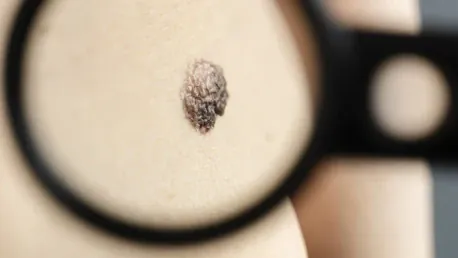With the rise in skin cancer cases globally, there is a pressing need for innovative detection methods that are accurate, non-invasive, and capable of delivering quick results. Singaporean scientists have taken a significant leap in this domain by developing an advanced AI-powered imaging technology that could potentially revolutionize the detection and management of skin cancer. This breakthrough combines Multispectral Optoacoustic Tomography (MSOT) with artificial intelligence (AI) to produce detailed, real-time 3D images of skin tumors, thus offering a promising alternative to traditional diagnostic tools.
A Revolutionary Approach to Skin Cancer Detection
Combining MSOT with AI for Enhanced Imaging
Scientists from the Agency for Science, Technology and Research (A*STAR) and the National Healthcare Group (NHG) have pioneered a method that integrates MSOT with AI to revolutionize skin cancer imaging. MSOT is an advanced technique that uses photoacoustic imaging, combining optical and ultrasound imagery to generate high-resolution, three-dimensional images of skin layers. This is further enhanced by a machine learning-based segmentation algorithm, which enables the system to identify and delineate boundaries of basal cell carcinoma (BCC)—the most common type of skin cancer—automatically. This method not only provides precise data about the tumor’s size, shape, and depth but also facilitates better treatment planning and execution.
The AI component of this technology ensures a higher level of accuracy and efficiency by eliminating human subjectivity in scan interpretation. Unlike conventional tools that might necessitate invasive biopsies or repeat surgeries to validate tumor margins, this AI-powered imaging penetrates deeper skin layers, revealing critical information without any invasive procedures. Consequently, patients benefit from enhanced diagnostic accuracy and reduced physical discomfort. The study highlights how this approach can improve surgical planning, reduce repeat procedures, and enhance patient outcomes by ensuring complete tumor removal in a single session.
Clinical Potential and Pilot Study
The rising incidence of BCC in Singapore, driven by higher UV exposure and an aging population, underscores the need for better diagnostic methods. Traditional approaches such as biopsies and Mohs surgery, though effective, are invasive, time-consuming, and sometimes leave uncertainties regarding tumor margins. To tackle these issues, a pilot clinical study was conducted at the National Skin Centre (NSC), involving eight patients who underwent MSOT imaging prior to surgery. The results were promising; the scans closely aligned with standard diagnostic tools’ outcomes, confirming the platform’s clinical potential.
Key medical professionals have underscored the significance of this innovation. Professor Malini Olivo from ASTAR emphasized the goal of mainstream clinical adoption to positively impact the lives of skin cancer patients. Professor Dinish U.S from ASTAR stated that the AI enhances scan interpretation by eliminating subjectivity and ensuring faster and consistent results. Additionally, NSC’s Professor Steven Thng highlighted the center’s pioneering role in utilizing advanced imaging tools to reduce reliance on biopsies and tailor patient care effectively.
Broader Implications for Cancer Care in Singapore
Potential for Broader Application
While the initial focus of this technology is on BCC, there is a strong belief among researchers that it could be adapted for other types of skin cancer. Continued clinical testing and the integration of advanced imaging techniques with AI could streamline and significantly improve cancer care across the region. This initiative is part of Singapore’s broader strategy to leverage science and technology for early detection, personalized treatments, and improved patient outcomes in various forms of cancer.
The commitment to using advanced technologies in transforming cancer care is evident in other initiatives as well. For instance, researchers are exploring DNA-tagged gold nanoparticles for more accurate drug delivery, which could further enhance the efficacy of cancer treatments. By emphasizing early detection and precise treatment, these technological advancements aim to reduce the economic burden of cancer management and improve the quality of life for patients.
The Future of AI-Powered Imaging in Healthcare
Singapore’s advancements in AI-powered imaging reflect a broader global trend towards integrating artificial intelligence with medical technology. The success of the MSOT and AI combination in skin cancer detection sets a precedent for future innovations in other medical fields. The potential applications of such technology are vast, ranging from early diagnosis to personalized medicine, where treatment plans could be tailored to the individual characteristics of a patient’s condition.
Moreover, the continuous collaboration between institutions like A*STAR, NHG, and NSC showcases the importance of interdisciplinary efforts in achieving breakthroughs in medical science. As these technologies evolve and become more accessible, they are likely to transform healthcare practices, providing doctors with better tools to diagnose and treat patients effectively.
A New Horizon in Skin Cancer Treatment
With the rise in global skin cancer cases, there’s an urgent need for innovative detection methods that are accurate, non-invasive, and capable of delivering quick results. Responding to this critical demand, Singaporean scientists have made a significant advancement by developing cutting-edge AI-powered imaging technology, poised to revolutionize the detection and management of skin cancer. This remarkable innovation involves the integration of Multispectral Optoacoustic Tomography (MSOT) with artificial intelligence (AI). By doing so, it enables the production of detailed, real-time, 3D images of skin tumors. This advanced process stands out as a promising alternative to traditional diagnostic tools, which often require invasive procedures and longer wait times. These detailed visualizations can greatly enhance the ability of medical professionals to diagnose and treat skin cancer more effectively, ensuring patients receive timely and precise care. This breakthrough could play a pivotal role in improving outcomes and saving lives worldwide.









